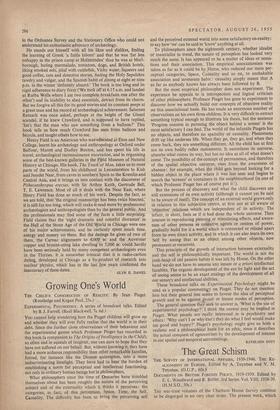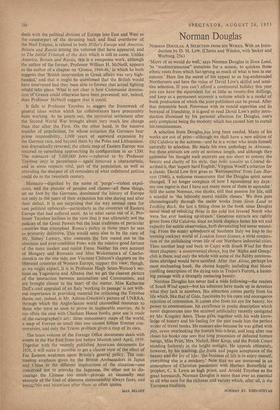The Great Schism
THE SURVEY OF INTERNATIONAL AFFAIRS, 1939-1946. THE RE- ALIGNMENT OF EUROPE. Edited by A. Toynbee and V. M. Taynbee. (O.U.P., 60s.) THE war-time volumes of the Chatham House Survey continue to be disgorged in no very clear order. The present work, which deals with the political division of Europe into East and West as the -counterpart of the thrusting back and final overthrow of the Nazi Empire, is related to both Hitler's Europe and America, Britain and Russia among the volumes that have appeared, and to The initial Triumph of the Axis which is still to come. Unlike America, Britain and Russia, this is a composite work, although the author of the former, Professor William H. McNeill, appears as the author of a chapter on 'Greece, 1944-46,' in which he both suggests that 'British intervention in Greek affairs was very high- hanfled,' and that it might be questioned that the British would have intervened had they been able to foresee that actual fighting would take place. What is not clear is how Communist domina tion of Greece could otherwise have been prevented; nor, indeed, does Professor McNeill suggest that it could.
It falls to Professor Toynbee to suggest the framework of general ideas within which his collaborators have presumably been working. As he points out, the territorial settlement after the Second World War brought about very much less change than that after the First. On the other hand, in the massive transfer' of populations, for whose initiation the Germans bear prime responsibility, 1,000 years of eastward expansion by the German race, and beyond them by the Poles and Lithuanians, was dramatically reversed; the ethnic map of Eastern Europe was restored to something approaching its configuration in AD 1200. The massacre of 5,000,000 Jews — referred to by Professor Toynbee only in parenthesis — again removed a characteristic, and in some respects vital, part of the population, as well as providing the sharpest of all reminders of what unfettered politics could do in the twentieth century.
Massacre—dignified by the name of 'purge'—violent expul- sions, and the plunder of peoples and classes—all these things, set on foot by the Germans, dominated the history of Europe not only in the years of their expansion but also during and after their defeat. It is not surprising that the way seemed open for vast political upheavals—particularly in the countries of Eastern Europe that had suffered most. As to what came out of it, Pro- fessor Toynbee inclines to the view that it was ultimately not the policies of the Great Powers but the local traditions of particular countries that triumphed. Russia's policy in those years he sees as primarily defensive. This would seem also to be the view of Mr. Sidney. Lowery, who contrasts the fate meted out to the otistinate and over-confident Poles with the relative good fortune of the more modest and realist Finns. Neither his own account of Hungary and Rumania and Miss Wiskemann's of Czecho- slovakia on the one side, nor Viscount Chilston's chapters on the liberated countries of Western Europe, support this view; though, as we might expect, it is in Professor Hugh Seton-Watson's sec- tions on Yugoslavia and Albania that we get the clearest picture of the interaction between nationalism and Communism, and are brought closest to the heart of the matter. Miss Katherine Duff's cool appraisal of an Italy 'working its passage' is not with- out importance in providing material for criticising the. Toynbee thesis; nor, indeed, is Mr. Ashton-Gwatkin's picture of UNRRA, through which the Anglo-Saxon world channelled resources to those who were so soon to prove its implacable enemies. As is too often tlie case with Chatham House books, poor use is made of. the cartographer's art : three unnecessary maps of the world, a map of Europe so small that one cannot follow frontier con- troversies, and only the Trieste problem given a map of its own.
The latest volume of the Foreign Office documents deals with events in the Far East from just before Munich until April, 1939. Together with the recently published American documents for 1918, it will make it possible to get a clearer view of the effect of Far Eastern weakness upon Britain's general policy. The con- trasting emphasis given by the British Ambassadors in Japan and China to the different implications of the situation—one concerned not to provoke the Japanese, the other not to dis- courage the Chinese too much—provide an unusually neat example of the kind of dilemma statesmanship always faces, and jouraa'ists and historians after them so often ignore. .
MAX BELOFF



































 Previous page
Previous page